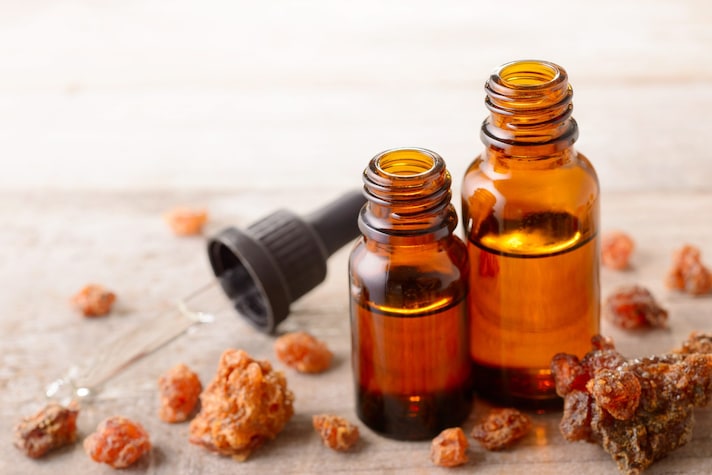11 Surprising Benefits and Uses of Myrrh Oil
Myrrh is a reddish-brown dried sap from a thorny tree that is native to northeastern Africa and Southwest Asia. A steam distillation process is used to extract myrrh essential oil, which has an earthy scent and an amber-brown color.
;Resize,width=742;)
You’ve probably heard of myrrh in bible stories, but you maybe didn’t know that you can still buy it today and use it for many beneficial things?
Myrrh is a reddish-brown dried sap from a thorny tree that is native to northeastern Africa and Southwest Asia. A steam distillation process is used to extract myrrh essential oil, which has an earthy scent and an amber-brown color.
Here’s 11 uses and benefits of myrrh oil:
1. Antibacterial

Myrrh was used in ancient Egypt in the embalming process, as it helped to slow decay due to its ability to kill bacteria and other microbes.
Myrrh incense was burned in places of worship in Biblical times, often alongside frankincense, to help purify the air. One modern study showed that burning myrrh and frankincense reduced airborne bacterial counts by 68%.
Myrrh oil could be effective in treatment of persistent Lyme disease, one study showed, as it killed all dormant Lyme disease bacteria.
2. Good for Oral Health

Myrrh has traditionally been used to treat oral infections and inflammation, and some natural toothpastes and mouthwashes contain myrrh oil, which is an approved flavoring by the FDA.
People who have Behcet’s disease – an inflammatory disorder – used a myrrh mouthwash to treat painful mouth sores four times daily over the course of a week. 50% of them reported complete pain relief, and 19% had complete healing of the sores.
High doses of myrrh can be toxic, so you should never swallow myrrh oral-care products. Myrrh should also be avoided if you have had recent oral surgery, as one study found that stitches can degrade when exposed to myrrh.
3. Supports Healthy Skin and Could Heal Sores

Myrrh has been used traditionally to treat skin infections and wounds, and scientists today are conducting research in these areas.
One test-tube study on 247 different essential oil combinations found that myrrh oil mixed with sandalwood oil was very effective at killing bacteria that infect skin wounds, and another study found that myrrh oil alone stopped 43-61% of the five fungi that cause skin conditions, including athlete’s foot and ringworm.
4. Helps Reduce Pain and Swelling

Myrrh oil contains substances that interact with opioid receptors in your brain, and tells it that there is no pain. Myrrh also blocks inflammatory chemicals that can lead to pain and swelling.
One study of people prone to headaches showed that when they took a supplement containing the pain-relieving compounds of myrrh their headache pain was reduced by around two thirds over the course of the six-month study.
5. Could Be a Strong Antioxidant

Antioxidants help to combat oxidative damage from free radicals, which can contribute to premature aging and some diseases.
One test-tube study found that myrrh oil was more effective than vitamin E at combating free radicals.
An animal study showed that myrrh oil helped protect the liver against lead-induced oxidative damage.
Myrrh oil is only safe for people to use either topically or inhaled, so it isn’t known yet if it protects your body against oxidative damage when used in this way.
6. Anti-Parasitic

Two common parasitic infections in the US are giardiasis, (an intestinal infection) and trichomoniasis, (a sexually transmitted disease).
Women who didn’t respond to treatment for trichomoniasis were given an oral drug called Mirazid, which was made of myrrh sap and essential oil. Around 85% of them were cured of the infection with this drug.
An animal study showed that the same drug also treated giardiasis effectively.
It is possibly also helpful against the parasite Fasciola gigantica, which can cause liver and bile duct diseases, but this is not proven.
7. Sunscreen

One test-tube study of SPF 15 sunscreen with added myrrh oil showed it was significantly more effective at blocking UV rays than the sunscreen on its own. Myrrh by itself was not as effective as the sunscreen.
8. Could Fight Cancer

Some studies in the lab suggest that myrrh oil could help kill or slow the growth of cancer cells in the liver, breast, prostate and skin, but it has not yet been studied on humans.
9. Healthy Gut

Myrrh compounds may help to treat intestinal spasms related to irritable bowel syndrome, and another animal study shows that myrrh could help treat stomach ulcers.
10. Antifungal
Test-tube studies show that myrrh oil may help kill mold, such as Aspergillus niger, which commonly forms mildew on damp walls, and A. flavus, which causes mold contamination of food.

11. Easy to Use
Myrrh should not be swallowed, but can be applied topically, inhaled, or used in oral care.
To use on skin, it’s best to dilute myrrh oil in a carrier oil like jojoba, almond, coconut or grapeseed oil to avoid irritation.
Use 3-6 drops of myrrh oil per teaspoon of carrier oil for adults, and for children, use 1 drop of oil per teaspoon of carrier oil.
To inhale, add 3-4 drops of myrrh oil to a diffuser to distribute the oil as a fine mist into the surrounding air.
You can also place a few drops of the oil on a tissue or cloth and inhale periodically, or add a few drops to hot water and inhale the steam.
Combinations for myrrh and other essential oils: spicy, citrus and floral essential oils, such as frankincense, lemon and lavender.
A test-tube study of myrrh and frankincense combined showed an improved effectiveness against infectious bacteria.
;Resize,width=767;)
;Resize,width=712;)
;Resize,width=712;)
;Resize,width=712;)
